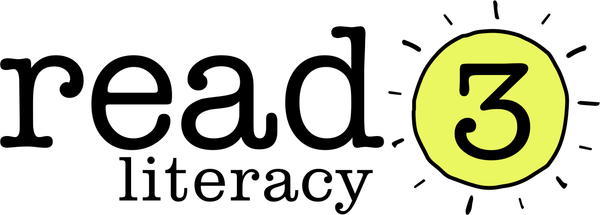The role of RAN in reading
A review of a recent presentation by Dr Elizabeth Norton
By Robyn Monaghan
The Reading League Illinois recently ran a session with Dr Elizabeth Norton titled "RAN and the Reading Brain". For anyone interested in early intervention and helping children at high risk of reading difficulties this is a must-see - we've even linked the video below, so there's no excuse! 😜 I recommend listening to the end as many common questions about RAN are answered during her Q&A.
I've pulled together some key points from Dr Norton's presentation which are included below. I'll finish by saying while this presentation focuses on what RAN is, the discussion around how best to support weak RAN is a discussion for another day!
What are RAN tasks?
RAN stands for Rapid Automatised Naming. RAN tasks are like a mini-version of the cognitive and linguistic processes involved in reading.

Just like text in a book, a RAN task is presented as an array of items in rows. Only about 5-7 items are used in the task and these items are distributed randomly across 4 or 5 rows with 10 items in each row. The items must be very familiar to the child, such as colours, objects, letters, or digits. If a child doesn’t know letters or numbers well, then colours or objects can be named instead.
The objective of the RAN task is for the children to name the items in order as quickly and as accurately as they can while being timed.
Asking the child to perform the task as quickly as they can simulates the ability to recognise and say the items automatically or without conscious thought, similar to mature reading ability.
Time taken is the key measure as it helps us understand a little more about the reading process in the brain.
Why are RAN tasks important in screening for reading difficulty?
RAN tasks share many common processes with reading, such as attention, visual recognition, integration, and retrieval processes.
The RAN task can be viewed as a microcosm of reading, like a surrogate for the reading process in the brain. RAN tasks therefore provide a small but revealing window into a child's reading potential and can be used to screen children as young as 4 years for possible struggles learning to read.
By adding RAN tasks to early screeners, professionals can better identify children at risk of dyslexia and understand the nature and extent of their difficulties. This insight helps us choose appropriate intervention strategies that focus on orthographic mapping, automaticity and reading fluency.
Is RAN research in the Science of Reading?
Yes. Numerous studies have shown strong correlations between people with faster RAN and stronger reading ability. The relationship between RAN tasks and reading is also supported by neuroimaging studies. These studies have shown that similar areas of the brain are activated when mature readers perform RAN tasks and reading tasks. The same areas ‘light up’, indicating the commonalities between these two activities. When RAN tasks are performed slowly or hesitantly or with many errors, the child has a higher risk of reading difficulties and/or dyslexia.
Can RAN difficulties be helped by intervention?
Despite its diagnostic potential, RAN tasks are not, by themselves, a cure or solution to reading difficulties. At present, there is no known method to directly improve a child's RAN ability. The best approach for supporting children with slower RAN scores is to focus on enhancing their accuracy and automaticity in all other language and literacy areas in an effort to develop a well-connected reading circuit in the brain.
Strengthening all the connections in the child’s reading circuit to progressively build their reading skills will help compensate for weak RAN. Understanding the need for carefully planned early intervention for children is vital, especially if weak RAN is accompanied by weak phonological awareness or weak language skills.

Wanting to check RAN?

3 comments
Great presentation. Since I am listening to the recording, I was disappointed that the feedback about repeated reading was not shared until the recording was stopped (in other words, with the live audience only). Unfortunate choice by the presenter and moderator.
Thank you so much for sharing. It was wonderful to get such in depth explanation of RAN and the impacts it can have on developing readers. I’m now off to dig deeper with -Blame it on Gutenberg.
An excellent presentation, I learned a lot, very relevant to clinical practice too. An added, much appreciated bonus bonus is the free RAN screener, I have been struggling to access one. Many thanks,